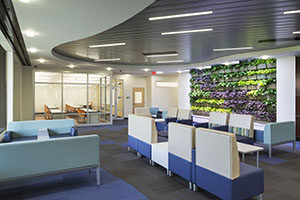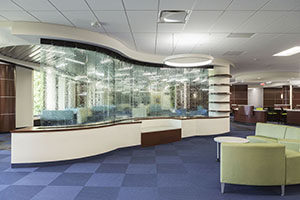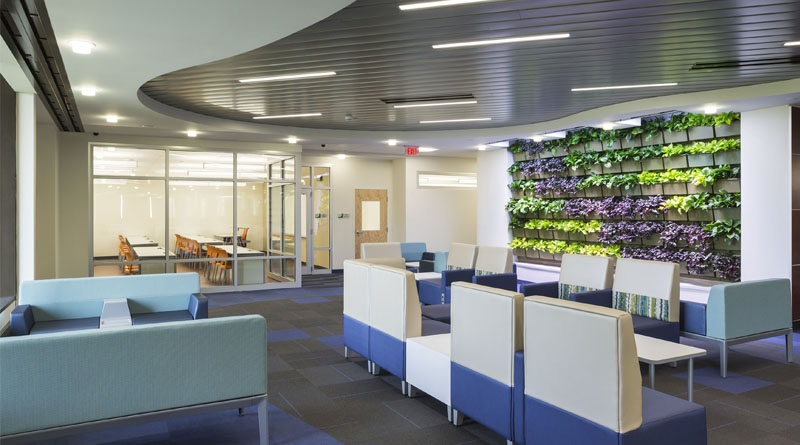By Rachel Leber
NEWARK, N.J. — Essex County College in downtown Newark will open its new state-of-the-art media center and student lounge at the college’s main campus during the last week of August — just in time for the beginning of the fall semester.
The project was designed by RSC Architects of Hackensack, N.J., to create an atmosphere that will encourage collaboration, creativity and relaxation. The new space replaces the former Martin Luther King, Jr. Media Center and is located on the fourth floor of the Zachary Yamba building.

Construction on the 18,800-square-foot “information commons” began in January of 2016 and was completed in July of 2017. DLB Associates of Eatontown, N.J., was the MEP Engineer, and H&S Construction of Elizabeth, N.J., was the general contractor on the project. The goal of the project was to transform the existing out-of-date library into a state-of-the-art technology electronic multi-disciplinary library. The media center has 140 computer workstations, seven classrooms, breakout rooms, open lounges and a computer lab. The budget of the entire project was $4 million.
The new media center will consolidate reference information and technological needs as well as provide student and faculty collaboration space. The space includes a service desk that is staffed by library and information technology personnel where students can receive help with a wide range of problems, including technological and informational needs, as well as support in multimedia production — capabilities that the new media center now possesses.
The new media center offers more than a typical library by providing a range of services broader than the traditional library, according to Kenneth P. Mihalik, senior project manager at RSC Architects. “Whereas a ‘traditional’ library focuses on providing quiet space for individual study, this information commons is configured for use by small groups of students, reflecting students’ desire for collaborative learning and combining social interaction — all of which allows students to work together efficiently on projects,” said Mihalik.

Photo Credit (all): Kate Glicksberg & RSC Architects
Additionally, the project contains a unique aesthetic and provides ambience not often found — a live “green” wall and a water feature that enhances the physical environment by providing a softer, quieting atmosphere to contrast the campus’ “hectic urban location.” The water wall uses synthetic oil between two pieces of glass to create the look of flowing water in the middle of the bustling media center. The living wall comprises a unique pattern of regenerative plants and will be maintained by an automated watering system and campus staff. This space will become the new student commons on campus due to its multifunctional nature and the attractiveness of the design.
“We saw an opportunity here to create a space that provides more than a place to study; it provides inspiration and serenity at the same time,” said Dr. Joyce Wilson Harley, vice president of administration and finance for Essex County College, in a recent statement. “Having an open space with a forward-thinking design encourages our students to do their best work while the incorporation of natural elements creates an interesting and engaging setting.”
The biggest challenge of the project was performing construction work while keeping the other portions of the library in operation, according to Mihalik. Phasing was an important aspect of the project where book stacks needed to be relocated, pipe penetrations needed to be added and mechanical systems needed to be installed — all while keeping the library in operation for students.
“This project provides for a very unique set of activities to occur in a single space on campus that has never occurred before,” Mihalik said. “Here, students can conduct extensive research for information, access electronic multimedia equipment and software, collaborate on projects with other students and faculty, access instructional spaces and have access to a quiet place to work independently.”


